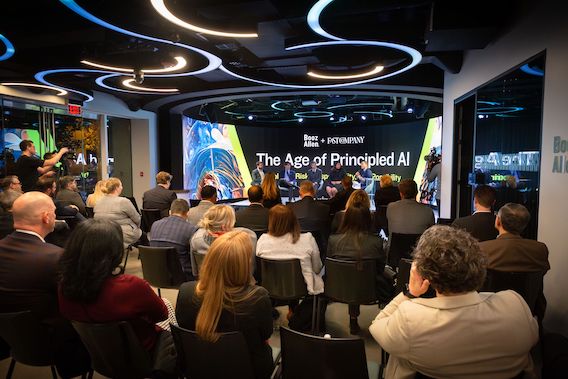















November 13, 2023 | permalink

Everything is coming up AI these days, including me. Last week, I had the privilege of moderating “The Age of Principled AI,” a panel hosted by Fast Company and Booz Allen Hamilton exploring the ramifications of President Biden’s Executive Order and how to regulate AI going forward.
I was joined onstage by Navrina Singh, CEO of Credo AI; John Beezer, senior advisor to the U.S. Senate Committee on Commerce, Science, and Transportation; the Department of Defense’s Dr. Matt Johnson; and Randal Meyer, chief counsel and legislative director to Representative Nancy Mace. According to GPT-4’s summary of the event, here’s what we talked about:
1. Turning Point for AI Ubiquity: Susan Penfield, Booz Allen’s CTO, opened the event, highlighting the White House’s executive order on AI and the growing ubiquity of AI in various sectors. She raised critical questions about AI governance and mitigating unintended consequences.
2. Government’s Role in AI: The panelists agreed on the need for a robust regulatory framework for AI. The discussion centered around the recent executive order, highlighting the need for a coherent national policy and its impact on various sectors, including national security.
3. AI in Legislation and Policy: Discussions involved congressional perspectives on AI regulation, touching on the need for statutory authority for AI governance. The panelists debated approaches to AI legislation, including self-certification, third-party audits, and the necessity of establishing clear standards for audits and assessments.
4. Operationalizing AI Ethics: Matthew Johnson, Senior Technical Advisor in Responsible AI at the DoD, discussed the DoD’s approach to operationalizing AI ethics, including a toolkit for responsible AI deployment. This toolkit aims to provide a framework for aligning AI applications with ethical principles and values.
5. Impact of AI on National Security: The panel addressed the implications of AI in national security, including the importance of using AI responsibly and ethically in defense contexts. They emphasized the need for AI technologies that align with democratic values and principles.
6. Role of Procurement in AI Deployment: Discussions highlighted the role of procurement as a tool for influencing the development and deployment of AI technologies. The need for clear criteria and benchmarks to ensure alignment with ethical principles was emphasized.
7. Innovative AI Use Cases in Government: Examples of AI applications in government agencies, such as the Social Security Administration, were discussed to illustrate the potential of AI in improving services and decision-making processes.
8. Need for AI Literacy and Expertise: The panelists underscored the importance of AI literacy and the need to build capacity within government agencies and other stakeholders to understand and effectively use AI.
9. Challenges in AI Regulation: The challenges of regulating AI were a central theme, with discussions around balancing innovation with regulation, anticipating threats, and ensuring that AI applications do not infringe on rights or freedoms.
10. Future of AI Governance: The event concluded with reflections on the necessity of a multi-stakeholder approach to AI governance, the importance of aligning AI with societal values, and the potential of AI to transform government missions and societal outcomes.


» Folllow me on Twitter.
» Email me.
» See upcoming events.

Greg Lindsay is a generalist, urbanist, futurist, and speaker. He is a non-resident senior fellow of the Arizona State University Threatcasting Lab, a non-resident senior fellow of MIT’s Future Urban Collectives Lab, and a non-resident senior fellow of the Atlantic Council’s Scowcroft Strategy Initiative. He was the founding chief communications officer of Climate Alpha and remains a senior advisor. Previously, he was an urban tech fellow at Cornell Tech’s Jacobs Institute, where he explored the implications of AI and augmented reality at urban scale.

January 31, 2024
Unfrozen: Domo Arigatou, “Mike 2.0”
January 22, 2024
The Future of Generative AI in Architecture, Engineering, and Construction
January 18, 2024
The Promise and Perils of the Augmented City
January 13, 2024
Henley & Partners: Generative AI, Human Labor, and Mobility

----- | January 22, 2024
The Future of Generative AI in Architecture, Engineering, and Construction
----- | January 1, 2024
----- | August 3, 2023
CityLab | June 12, 2023
Augmented Reality Is Coming for Cities
CityLab | April 25, 2023
The Line Is Blurring Between Remote Workers and Tourists
CityLab | December 7, 2021
The Dark Side of 15-Minute Grocery Delivery
Fast Company | June 2021
Why the Great Lakes need to be the center of our climate strategy
Fast Company | March 2020
How to design a smart city that’s built on empowerment–not corporate surveillance
URBAN-X | December 2019
CityLab | December 10, 2018
The State of Play: Connected Mobility in San Francisco, Boston, and Detroit
Harvard Business Review | September 24, 2018
Why Companies Are Creating Their Own Coworking Spaces
CityLab | July 2018
The State of Play: Connected Mobility + U.S. Cities
Medium | May 1, 2017
Fast Company | January 19, 2017
The Collaboration Software That’s Rejuvenating The Young Global Leaders Of Davos
The Guardian | January 13, 2017
What If Uber Kills Public Transport Instead of Cars
Backchannel | January 4, 2017
The Office of the Future Is… an Office
New Cities Foundation | October 2016
Now Arriving: A Connected Mobility Roadmap for Public Transport
Inc. | October 2016
Why Every Business Should Start in a Co-Working Space
Popular Mechanics | May 11, 2016
Can the World’s Worst Traffic Problem Be Solved?
The New Republic | January/February 2016